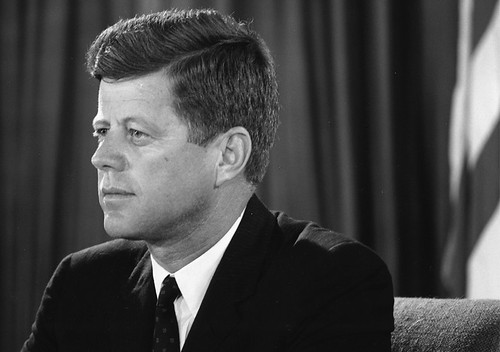 |
| Photo Credit: U.S. Embassy New Delhi |
In the midst of a highly contested U.S. presidential primary season, a new book uncovers aspects of the personal life of President John F. Kennedy. The book, written by a former White House aide who claims she had an affair with President Kennedy, once again raises the question of personal character as it pertains to qualifications for the nation's highest office.
The suggestion of indiscretions on behalf of President Kennedy is not news to presidential historians. This has been commonly known for some time. What is intriguing to consider is whether Kennedy would have ever gotten elected in the first place had he lived in our TMZ-driven culture. Several current individuals aspiring to the presidency have had to face allegations of their own marital infidelities and this has been fatal for some (see Herman Cain) and could be for others (see Newt Gingrich).
What this tells us that character, who we are at our moral core, still appears to matter to the American public. Robert Dallek writes in The Daily Beast why character does matter for presidents:
"Presidents are not only the country’s principal policy chief, shaping the nation’s domestic and foreign agendas, but also the most visible example of our values. As a country that prides itself on being the world’s exemplar of human rights, the rule of law, and moral standards, it is embarrassing to have men seeking and/or serving in the presidency who fall short of our highest ideals. True, most Americans give lip service to the proposition that even the most exalted among us have their flaws, but we are eager to believe that presidents manage to rise above the limitations that beset the rest of us.
We have been constantly disappointed in the many ways presidents and lesser public officials have fallen short of what we expected of them—Harding’s Teapot Dome scandal; Harry Truman’s influence-peddling associates; John Kennedy’s hidden medical history and compulsive womanizing; Ted Kennedy’s Chappaquiddick; Lyndon Johnson’s vulgarity that many complained undermined the dignity of the presidency; Richard Nixon’s resignation for abuse of power; Ronald Reagan’s Iran-contra scandal; Bill Clinton’s Monica; and George W. Bush’s Valerie Plame expose are among the most memorable of our recent public embarrassments.
...Whether we like it or not, president’s private lives are no longer hidden from public view. And it is not without benefit to have this information. Presidential character matters and not just for the symbolic reasons I mentioned. Wouldn’t the country have been better served taking account of Harding’s moral failings? Certainly, voters acted recklessly in ignoring complaints that Nixon, despite assertions that we were dealing with the “new” Nixon, deserved the epithet, “tricky Dick.” We were certainly forewarned about Clinton’s womanizing, which undermined his presidency. James Monroe’s assertion that “national honor is the national property of the highest value” remains an enduring ideal.
Should politicians’ character flaws, then, bar them from office, especially the oval office? Or does this set an impossibly high standard? Probably. Presidential aspirants reach for the highest office to satisfy some yearning for greatness or even immortality. The historian Richard Hofstadter said that politics for a majority of office holders, and particularly those obsessed with getting to the White House, is a form of vocational therapy. Grandiosity or convictions about standing apart from ordinary men seems to be a central component of the country’s most ambitious politicians. Ambition, of course, is not without its virtues. But when politicians, and especially presidents, let their need to win eclipse the larger good, as has so often been the case, it makes presidential striving a national problem."Whether a man (or woman) has been faithful to their spouse should not be the only factor in deciding who we vote for. For it is true that just because a woman or man has remained true to their marital vows does not mean they will necessarily make a good president. But I also know this: If a person hasn't been true to the one person they've vowed before God to remain faithful, it would be naive to believe that they'd be true to the common American citizen.
Yes, character still matters.
To read the complete Dallek article please click here.
No comments:
Post a Comment